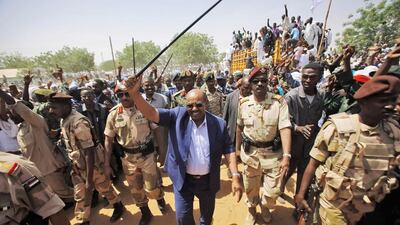In November 1997, president Bill Clinton signed an executive order imposing a comprehensive trade embargo on Sudan and freezing the assets of the government in Khartoum. These sweeping sanctions were prompted by Sudan's repeated violations of human rights, efforts to destabilise neighbouring governments and, crucially, its support for international terrorism. Osama Bin Laden was a long-time guest of the Sudanese government before he moved his operations to Afghanistan in 1996.
Over the years, the sanctions multiplied. In 2005, George W Bush piled on additional penalties, prohibiting US citizens from trading with Sudan's petrochemicals industries. Washington pointedly exempted South Sudan, then clamouring for independence, from the sanctions, conferring de facto legitimacy on the breakaway aspirations of its leaders and creating an internal imbalance that isolated the government of Omar Hassan Al Bashir. South Sudan seceded in 2011, taking with it three-quarters of united Sudan's oil wells.
_________________________
Read more
US lifts 20-year sanctions on Sudan
Obama orders lifting of trade sanctions on Sudan
South Sudan marks grim 6th independence anniversary
_________________________
What, observers began to ask, was the purpose of the sanctions? President Barack Obama's decision to revoke some of the penalties against Sudan before he left office in January seemed to suggest that the sanctions had failed to achieve their goals. But the opposite is true. The sanctions did not eliminate all the problems, but as Mr Obama's executive order stated, they produced a "marked reduction in offensive military hostilities" by Khartoum, while improving humanitarian access throughout Sudan and increasing its anti-terrorism cooperation with the US.
Donald Trump's decision this week to go even further in dismantling sanctions rewards what the US state department calls "sustained positive actions" by the government of Sudan in satisfying the conditions imposed on it by Washington. Among them is Sudan's extension of ceasefire with rebels until October. Khartoum, not long ago a major purchaser of North Korean weapons and not an insignificant trading partner of Iran's, has moved away from both Pyongyang and Tehran. Two of the world's deadliest regimes are a little weaker today, thanks to the sanctions.
Critics who say that sanctions relief to Sudan sends the wrong message neglect the disproportionate pain they caused the people of Sudan. They ignore, too, the obvious fact that by removing sanctions, the US is signalling to other rogue states that verifiable change in conduct will not go unnoticed or unrewarded. The road to redemption may be long, tortuous and painful, but it exists and is navigable. There is a lesson in here for all those who call for Iran's re-entry into the community of nations even as Tehran gratifies its nihilistic impulses by promoting terror in the region, abetting murderous tyranny in Syria and keeping alive its nuclear weapons programme. You don't alter the behaviour of a rogue regime by showering it with rewards. Rather, you reward a regime after it has altered its behaviour.
Follow The National's Opinion section on Twitter

